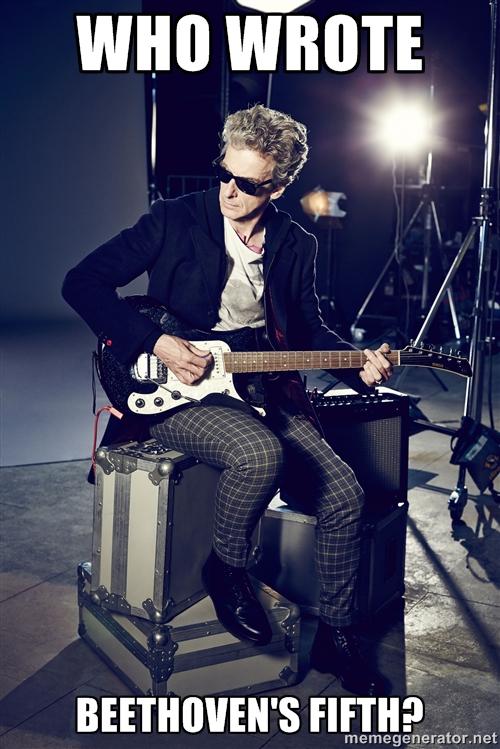The entire episode “Before the Flood” is about the bootstrap paradox, something that comes up sooner or later in every science fiction story, and is nothing new to Doctor Who. But this episode tackles it explicitly – indeed, so explicitly that the opening segment prior to the credits is essentially a PSA about the bootstrap paradox.
What is the bootstrap paradox? Radio Times has a great article about it, focused on this episode of Doctor Who. It is the question at the heart of “Behold the Man.” But in this episode of Doctor Who, it is Beethoven rather than Jesus that is the focus. Let’s say the Doctor loves Beethoven’s music. He travels back to meet his favorite composer, but no one has heard of him. And so he pulls out sheet music he planned to have Beethoven sign, and copies it and publishes it himself under Beethoven’s name.
The puzzle is: who actually composed the music?
The episode then tells a story that seems like it is going to go in a different direction, with time avoiding such paradoxical loops. But in the end, the Doctor comes up with a plan, inspired by the information he got when he called Clara and saw it unfolding in the future. So who thought of it, and when?
The episode has some interesting elements in it related to religion. The Doctor’s showdown with the Fisher King happens in a Russian Orthodox church, which is part of a fake Russian village in Scotland used during the Cold War for military training. The very phrase “before the flood” has Biblical resonances, and the Doctor ends up being the one who flooded the world to stop an evil force. The Fisher King had been transported in a spaceship that was a hearse, by Prentis who is from the planet Tivoli, which the Fisher King had previously conquered. The Fisher King turns out not to be dead, and the grave clothes he leaves behind are reminiscent of the stories about Jesus and about Lazarus in the New Testament. And the Doctor’s speech, suggesting that there might be laws about life and death and souls which trump even the laws of time, raises the question of where such laws come from.
I enjoyed the episode, precisely because it wasn’t just another story featuring the bootstrap paradox, but one in which the question itself was addressed, with an explicit invitation to viewers to puzzle over it as well.
What did you think of the episode?













